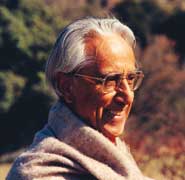




Christianness, Christianity, Christendom
“To be Christian can be understood as the confession of a personal faith that adopts an attitude analogous to that of Christ, to the measure that Christ represents the central symbol of one’s own life. I give the name Christianness to a new, but genuine Christian consciousness… This new conviction is spreading throughout the world, especially among the younger generations, and among those who have moved away from the over-institutionalization of Christianity, official Christianity in particular“ (“The Dawn of Christianess”, New York 2000).
Christianness is the encounter with Christ at the center of one’s self, at the center of the human community and at the center of reality. It is a personal christic faith that tries to adopt the posture of Christ (the “christic principle”) and would come to be “an ecclesiastical mutation” in Christian self-understanding beyond that of medieval Christendom and modern Christianity. In this self-understanding, Christ as the mystical nucleus of faith would have more weight than the Church (the sacramental dimension) and more than Christianity (the social aspect). It is not a matter of a totally new reality, but rather of one present in many great Christians throughout history, who for that reason may have wound up uncomfortable in the Church itself. Their names are a roll call of illustrious Christians who lived their Christianness after "overcoming" the prevailing Christianity or Christendom: Tertulian, Origen, Joaquín de Fiore, Dante, Eckhart, Nicholas of Cusa, St. John of the Cross, Teilhard de Chardin, Thomas Merton, Le Saux, etc. It would be a form at once new and ancient of conceiving a Chrsitic existence. It has aided in a double liberation: liberation from a fixed and determined political order (Christendom) and liberation from Christian identity linked to the acceptance of a determined set of religious and cultural norms (Christianity).
For Panikkar, the Church and Christianity itself must evolve from rigid collective structures to a more personal conception, Christianness, which may well come to be the way of living the Christian realityin the third millennium, overcoming the second millennium in which Christianity had probably been too imbued with Christendom. He insists on the experiential dimension and that Christ is not the heritage of the Christians only: to speak of Christianness is to speak of a Christian identity that goes beyond a juridico-institutional membership and beyond even a doctrinal consensus. It is a matter of being “athirst for the kingdom” and achieving the experience of confidence in the Spirit that Jesus Christ had.
The ecclesiastical mutation in Christian self-understanding attempts to be nothing less than “the Christian contribution to the cosmic change in the adventure of the universe in which all of us are implicated (“L’albada de la cristiania”). Panikkar’s most daring commitment is to attempt to go beyond the merely historical reality of Christianity in order to affirm that Christianness is a factum, something not solely dependant on us. Panikkar defines the meaning of this factum with a triple distinction: Christianity (social aspect), Church (sacramental dimension), and Christ (mystical nucleus of faith, Christic principle). This Christic principle probably serves as the authentic identification for many who identify themselves as Christians and do not feel separated from Christ nor outside the Church, inspite of not obeying all the ecclesiastic laws, although it is not an individualistic position, it is not “an uncontrolled anarchy” (“The Dawn of Christianess”).
Christianness would definitely take very seriously overcoming the Law without falling into the temptation of Christendom. The experience of Christian maturity that the concept of Christianness wishes to transmit arises as a new hope: the encounter with Christ at the center of one’s self, at the center of the human community, and at the center of reality.
official site